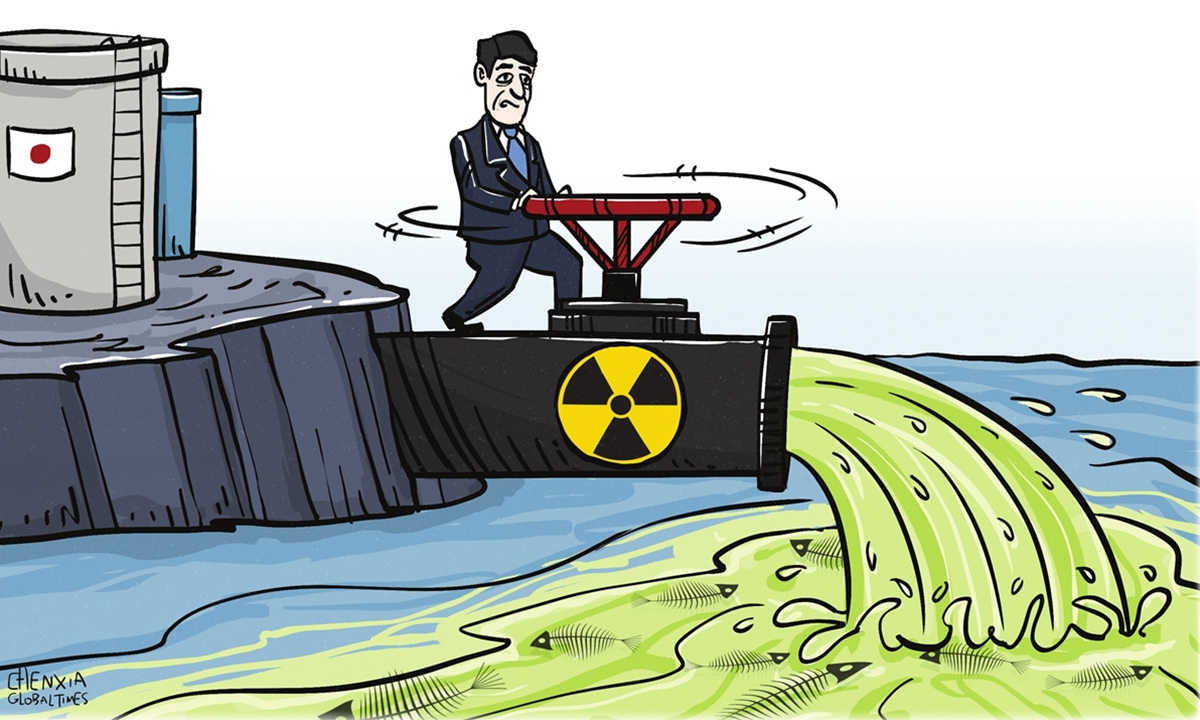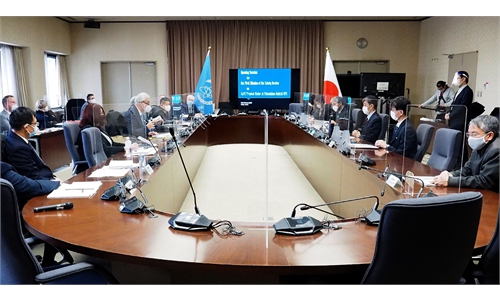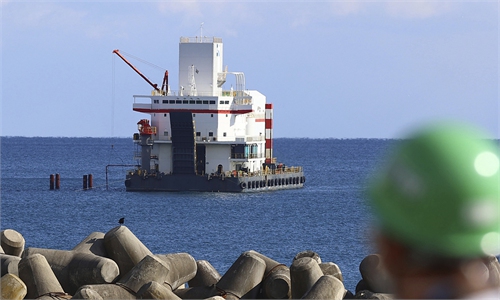US’ silence on Japan’s nuclear-contaminated wastewater dumping shows ugly geopolitics

Illustration: Chen Xia/GT
Editor's Note:
Japan's plan to dump nuclear-contaminated wastewater into the ocean has been strongly condemned by the international community. Nonetheless, Tokyo is still going its own way and speeding up the plan to make the rest of the world pay for it. What harm will Japan's action bring in terms of the environment and international relations? What should relevant parties do to prevent the selfish act of Japan? Global Times (GT) reporter Wang Wenwen talked with Duncan Currie (Currie), who has practiced international law and environmental law for over 35 years, over these issues.
This is the first piece of the series.

Duncan Currie Photo: Courtesy of Currie
GT: What impact will Japan's dumping of its nuclear-contaminated wastewater have on the environment?Currie: Obviously, we know with the trajectory of the water after the Fukushima earthquake and the initial spills, the water will go into Korean and Chinese waters, as well as into the high seas. But we also know from modeling that in several years, we'll also find the way throughout the North Pacific as well, so interfering with tuna populations and the fishing of Pacific islanders down there.
The biggest concern is the effect of the radionuclides on the marine environment, and the trouble is that the required studies just have not been done. They need to be done to study the uptake of the organisms over 30 years. It's not just like one dump, because when the International Atomic Energy Agency is doing the research, they focus very much on what's called dose response. It is the cumulative and long-term effects that are of concern.
Decades, at least 30 years of the continuous discharge of radioactivity gives rise to the obvious question of what happens when that gets taken up in the food chains when it settles into the sediments of the deep sea, and then it is taken up by species in the deep sea, and then that goes through the food chain there.
The other question is what radioactive substances will be there. We know there will be a lot of tritium, and there are different forms of tritium. Organically bound tritium is the one that we're concerned about, and we know very little about it. There's been one study, for example, in Canada, where they did study just the initial results of the uptake of tritium by mussels. They do know that there are harmful effects of the uptake of tritium in the water. That's the single biggest debate, and most of the scientific work around tritium must be done about the atmosphere.
Again, the work in the marine environment just hasn't been done. I noticed that when China and South Korea asked Japan what studies it has done on the effects of marine organisms, basically, the answer was only three. There should be more like 3,000. You've got to study the organism and the effects of radioactivity on the organism. It takes time, because it is about something very long-term.But then you've got the much more harmful substance, such as the strontium-90 and carbon-14, in particular. The problem is that we don't know how much carbon-14, which is not proposed to be removed, and how much even strontium-90 is going to be in the water. That depends on the efficiency of the treatment process. The concerning thing is that the Japanese government initially was talking about removing it below detectable levels, and then changed that and said below regulatory levels.
That is a real concern. The point is what the effect of these substances on the marine environment is. We do know that the earlier tests of the ALPS system weren't encouraging. A lot of the water had to be treated again.
There are also the effects on fisheries. Some studies have shown, for example, in South Korea, the vast majority of consumers said they would not buy fish that has been irradiated by the Japanese radiation. For fishermen employed in the Korean fishing industry, that's a real concern for the livelihood of the fishing industry. And that doesn't depend on whether or not the specific fish that they sell is going to be radioactive. If the public stop buying the fish, you're harmed by such a decision, whether it is radioactive or not.
So there are a number of different effects, but the bottom line is what Japan is doing is it's passing on the damage from itself to the ocean and to other countries and other peoples.
GT: Why does Japan insist on dumping the wastewater despite opposition from many countries?
Currie: There are alternatives, such as they could buy or acquire more land and then build more storage tanks. We know that tritium has a short half-life of about 12 years, so that if you can store it for one decade or two decades, the radiation goes down a lot. That's a very viable alternative. This is the most sensible one.
There are also technical options to remove the tritium. What that makes you think is this is all about saving money.
To answer your question, there's no doubt that the Japanese government is being selfish. They have an obligation to consult with other countries, which they haven't done. They have an obligation to carry out an environmental impact assessment of the effects of radiation on the high seas and other countries' waters. They haven't done that. They're acting out of their own self-interests and not participating in the international community in the way that international law and diplomacy require them to do.
GT: So far, we have not heard official voices from the US or the West opposing Japan's decision. Do you take it as an encouragement for Japan?
Currie: Yes, I think it's largely geopolitics, to be honest. The US wants to support Japan against China. And it's kind of ugly geopolitics as the way I see it. I don't think the US has any real studies of the situation. It comes to the conclusion that it's actually OK. They just want to support their ally, but it meanwhile undermines other allies, such as South Korea and the northern Pacific countries. So we really would hope that the US would reconsider its support.
GT: What impact will Japan's decision bring to international relations in the near future?
Currie: It certainly is harmful, and I think it will continue to be harmful. As Japan goes on and does the release in the spring, then I think what you'll probably see is concern really getting much higher. It's bad for Japan's reputation. You may see consumer boycotts. It's bad for their industry. It's bad for Japan's participation in the international community. By far, I think the preferable thing will be for them to change course now and use one of the other options, rather than just carry on doing what they're now doing.
GT: What actions should other countries carry out?
Currie: By far, I believe the best answer is for the contaminated countries, such as Korea or one of the Pacific island countries, to take a case before the International Tribunal for the Law of the Sea, asking for what are called provisional measures, which is an emergency order or an injunction.
I think that such a case would have a very strong chance of success. It is expensive and you can have diplomatic repercussions. But I don't think Japan's leaving much choice in the matter. The approach of the IAEA was overall supportive and found a way to help Japan do it, which is unfortunate.
There have been discussions at places like the London Convention and Protocol to the Convention on the Prevention of Marine Pollution by Dumping of Wastes and Other Matter. That's been encouraging to the extent that the discussions are ongoing. They haven't been shut down yet. There is a legal debate about whether the London Convention and Protocol has the authority to consider this type of pollution. But so far, they have been happy to carry on discussing it.
International and multinational avenues have been actively working on this issue so far. But they haven't been effective in stopping it. Quite honestly, I think that the best solution really is a case before the Tribunal of the Law of the Sea. If there was an order by the tribunal, Japan would obey it. There was one example in the past. It involved Japan in southern bluefin tuna, where Japan was carrying out what they called an experimental fishing program. And the tribunal ordered them to stop it and enter into negotiations. They did both of those things.
The other thing I would say is that bringing a case before the International Tribunal of the Law of the Sea has the benefit of stimulating diplomatic discussions. It's a really important byproduct of having these kinds of cases.
GT: What's your prediction for the evolvement of the matter?
Currie: I don't have a crystal ball, but it's not looking as though Japan is going to change its mind anytime soon. What may end up happening is they do start the discharge into such a big public outcry that it motivates countries to take actions. That's probably the most likely scenario.
I would advise that governments protest to Japan, make diplomatic protests, bring a case to the International Tribunal for the Law of the Sea in every form they can, including in the General Assembly of the United Nations, as well as have a debate in Security Council, although the US is a veto as well as other countries such as France and the UK. So the General Assembly may be a more viable forum for this kind of discussion.
There's already been a discussion in the Human Rights Committee. There are other bodies in Geneva, as well as in New York, that we can talk about it from a human rights point of view, which is really important.


